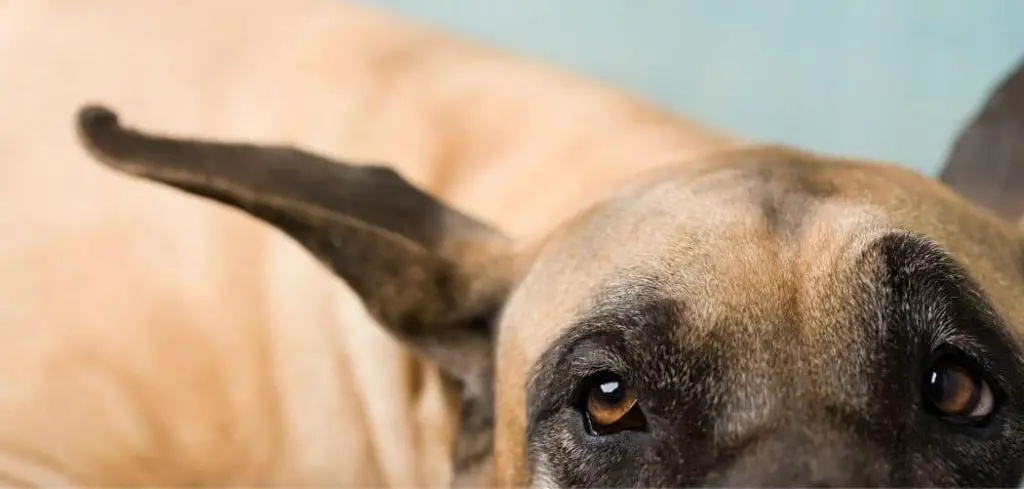When your dog starts having accidents in the house despite being previously housetrained, it can be both worrying and frustrating. Incontinence linked to stress is a real issue that can signal emotional or physical health challenges.
We outline the common causes of dog incontinence due to stress, what you can do at home, and when to seek veterinary help.
Dog Incontinence Due to Stress — Why It Happens
Dog incontinence due to stress happens because stress can disrupt a dog’s normal bathroom habits and even weaken bladder control. Changes in environment, loud noises, new pets, or separation anxiety can all trigger stress-related accidents.
Stress can also exacerbate existing medical conditions, such as urinary tract infections or hormone imbalances, making incontinence worse.
Dogs under stress may also drink more water, adding to the urgency and frequency of urination.

Common Causes of Dog Incontinence Due to Stress
Separation Anxiety
When left alone, some dogs experience extreme emotional distress. This stress response can lead to a lack of control over bladder muscles. You may notice puddles near the door or in areas your dog frequently waits for you.
The anxiety can be intense enough to affect their overall health, leading to repeated accidents even after you return home.
Read more: Dog Colitis Due to Stress (Here’s why)
Environmental Changes
Moving to a new home, introducing a baby or another pet, or even rearranging furniture can unsettle your dog.
These stressors can lead to temporary incontinence, as your dog’s nervous system remains on high alert.
The unfamiliar environment may also disrupt established potty routines, increasing the likelihood of accidents.
Loud Noises and Phobias
Fireworks, thunderstorms, or construction noise can frighten dogs to the point where they lose control of their bladder. This type of incontinence often occurs suddenly and may be accompanied by shaking, panting, or hiding.
Repeated exposure to these stressors without relief can worsen the problem over time.
Medical Conditions Triggered by Stress
Stress doesn’t just affect emotions—it can also worsen or reveal underlying health problems. For example, a mild urinary tract infection might become more symptomatic during stressful periods.
Bladder stones, hormone imbalances, or neurological issues may flare up under stress, increasing urinary accidents.
Aging and Cognitive Decline
Older dogs experiencing cognitive dysfunction may become more anxious or confused, leading to stress-related incontinence. They may forget their housetraining or become disoriented in familiar spaces.
Stress from cognitive decline can amplify these accidents, making them more frequent and unpredictable.
What to Do If Your Dog Is Experiencing Incontinence Due to Stress
Begin by reducing your dog’s exposure to the stress trigger. For separation anxiety, this could mean gradual desensitization to your departures. For noise sensitivity, consider providing a safe, quiet space or using calming aids.
Maintain a consistent bathroom routine, offering more frequent potty breaks during stressful periods. Encourage calm behavior with positive reinforcement rather than punishment.
If the accidents persist, schedule a veterinary check-up to rule out medical causes. Sometimes a combination of stress management and medical treatment is necessary for improvement.
Consider environmental enrichment—puzzle toys, gentle exercise, and safe spaces—to help your dog feel more secure.
When to Call or Visit Your Vet
If your dog’s incontinence is accompanied by blood in the urine, strong odor, lethargy, or changes in drinking habits, see a veterinarian immediately. These could indicate infections or other serious health problems.
Also, seek help if the accidents are worsening or not improving despite managing stress. Chronic incontinence can lead to skin irritation, infections, and reduced quality of life.
Rapid changes in behavior alongside incontinence—such as confusion, aggression, or loss of appetite—should be addressed urgently.
Read more: Dog Dandruff Due to Stress (Why it happens)
Key Takeaway
Stress-related incontinence in dogs is both an emotional and physical challenge. Identifying and addressing the stress triggers, while ruling out medical causes, is key to helping your dog regain control.
With patience, consistent care, and veterinary support when needed, most dogs can return to their normal, happy routines—and your floors can stay clean.
